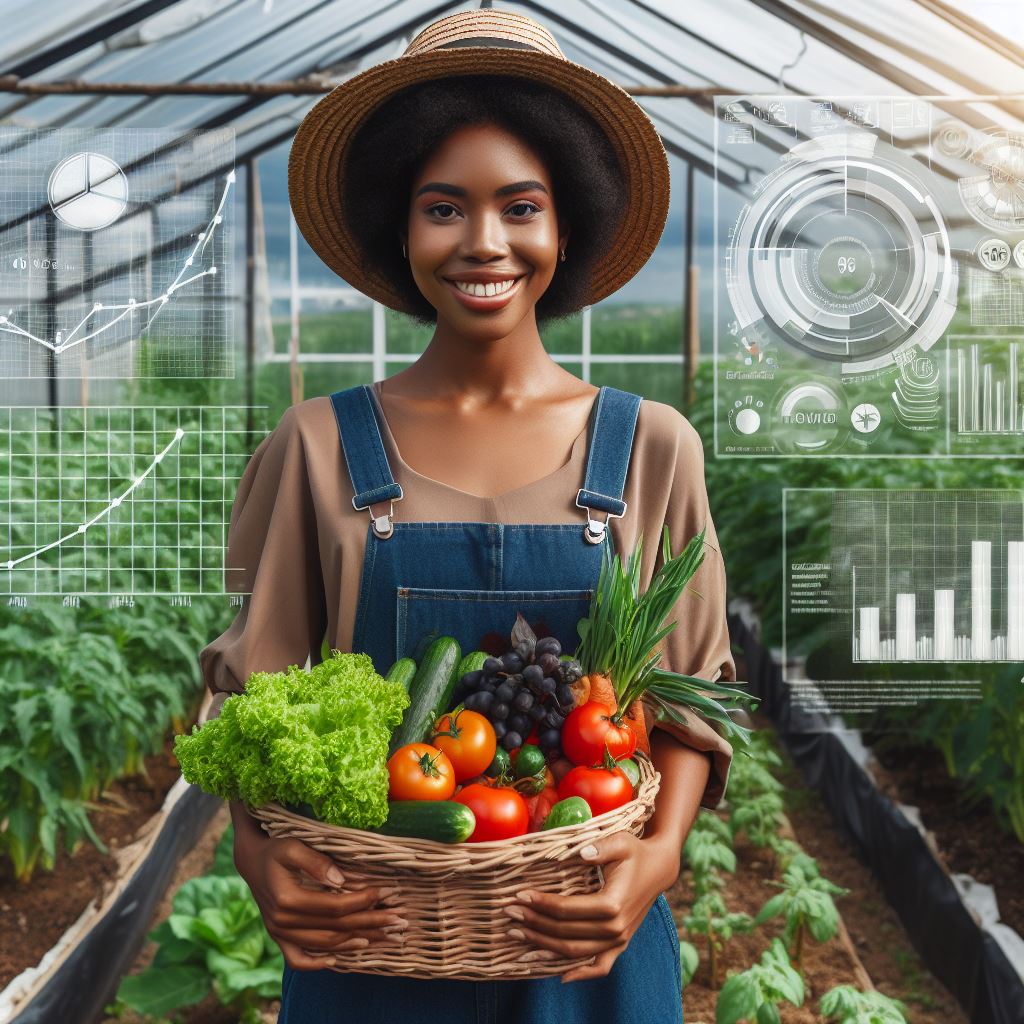Introduction to Farmers’ Tales
Knowing the stories behind our food is crucial in understanding its quality and origin.
There is a strong connection between farmers, who produce our food, and consumers, who consume it.
This blog post will provide an overview of the content we will be discussing.
The Importance of Knowing the Stories Behind Our Food
Understanding how our food is grown can help us make informed choices about what we eat.
Knowing the practices and values of the farmers can ensure higher food safety and sustainability.
It creates a sense of appreciation for the hard work and dedication of farmers.
The Connection Between Farmers and Consumers
Farmers play a vital role in feeding the world and nourishing communities.
Consumers have the power to support local farmers and contribute to a more sustainable food system.
Building relationships between farmers and consumers fosters transparency and trust.
Overview of the Blog Post Content
We will explore stories from farmers who grow a variety of foods, including fruits, vegetables, and grains.
Interviews with farmers will provide insights into their practices, challenges they face, and their commitment to sustainable agriculture.
We will also discuss the significance of supporting local farmers and where to find them.
In fact, understanding the stories behind our food is crucial for making informed choices, supporting local farmers, and building a sustainable food system.
Join us as we delve into the fascinating tales of farmers who work tirelessly to bring nourishment to our tables.
The Farmer’s Journey
Farming is more than just a profession; it is a way of life.
Farmers dedicate their lives to cultivating the land, growing crops, and feeding the world.
The journey of a farmer is not an easy one, but it is filled with passion and a deep connection to the land.
The life of a farmer
A farmer’s life revolves around daily responsibilities and hard work.
From dawn to dusk, they toil in the fields, tending to crops, and ensuring their livestock is well cared for.
They wake up early to milk the cows, feed the animals, and harvest the fruits of their labor.
Transform Your Agribusiness
Unlock your farm's potential with expert advice tailored to your needs. Get actionable steps that drive real results.
Get StartedHowever, the life of a farmer is not without its challenges and sacrifices.
They face unpredictable weather conditions, such as droughts, floods, and storms, which can devastate their crops.
They work tirelessly to protect their harvest and adapt to uncertain circumstances.
Farmers also sacrifice their personal time and often miss out on family events or vacations because the farm demands constant attention.
Passion for farming
Despite the hardships, farmers have an unwavering passion for farming.
For many, it is their family tradition and legacy.
They inherit the love for the land from their ancestors, who passed down their knowledge and techniques through generations.
Farmers take pride in continuing their family’s legacy and preserving the agricultural heritage.
Moreover, farmers have a deep love for the land and nature.
They have a profound understanding of the interconnectedness of all living things.
They appreciate the beauty of a sun-kissed field, the smell of freshly turned soil, and the melodies of birds chirping in the distance.
Farming allows them to foster a harmonious relationship with nature, nurturing the earth while it sustains them.
In short, the farmer’s journey is one of dedication, hard work, and passion.
They face daily responsibilities and challenges, putting in long hours to ensure a bountiful harvest.
Yet, their love for farming drives them to persevere.
Farmers carry the weight of their family traditions and legacy, cherishing the land and all it provides.
They are the unsung heroes behind the food on our plates, and their stories deserve recognition and appreciation.
Read: Cooking with CSA Veggies
Sustainable Farming Practices
Sustainable farming practices aim to minimize the negative impact on the environment and promote long-term viability.
Farmers are increasingly recognizing the importance of adopting environmentally friendly techniques to ensure the sustainability of their operations.
One such practice is organic farming, which eliminates the use of synthetic pesticides and fertilizers. Instead, organic farmers rely on natural methods to control pests and maintain soil fertility.
By avoiding the use of harmful chemicals, organic farming reduces the risk of contaminating soil and water sources.
This promotes healthier ecosystems and protects the health of farm workers and consumers.
Crop rotation and soil conservation are essential practices that help maintain soil health and prevent erosion.
The continuous planting of a single crop can deplete nutrients from the soil, leading to decreased yields and increased vulnerability to pests and diseases.
Through crop rotation, farmers alternate the types of crops planted each season, helping replenish soil nutrients naturally and reducing the need for chemical fertilizers.
Soil conservation techniques, such as contour plowing and cover cropping, further protect against erosion, preserving the integrity of the land for future generations.
Integrated pest management (IPM) is another sustainable farming practice that focuses on managing pests while minimizing chemical use.
IPM combines various strategies, including biological control, cultural practices, and the judicious use of pesticides.
This approach allows farmers to target pests specifically, reducing both the amount and frequency of pesticide applications.
By utilizing natural predators, crop diversification, and crop monitoring, farmers can significantly reduce chemical inputs, safeguard beneficial insects, and prevent pesticide resistance.
Adoption of environmentally friendly techniques
The adoption of environmentally friendly techniques is crucial for sustainable farming not only for the present but also for future generations.
By preserving natural resources and reducing the reliance on synthetic inputs, sustainable farming practices ensure the availability of vital resources, such as clean water and fertile soil, for future farming endeavors.
These practices promote a more resilient agricultural system capable of adapting to challenges such as climate change, population growth, and the need to feed a growing global population.
Importance of sustainability for future generations
Moreover, sustainable farming practices play a significant role in minimizing pollution and greenhouse gas emissions.
Industrial agriculture is one of the leading contributors to water and air pollution due to the excessive use of chemical fertilizers, pesticides, and manure from large-scale livestock operations.
Additionally, conventional farming methods contribute to greenhouse gas emissions through the use of fossil fuels, deforestation, and the release of nitrous oxide from synthetic fertilizers.
Sustainable farming reduces pollution and greenhouse gas emissions by using fewer chemicals, embracing renewable energy sources, and promoting biodiversity through organic practices.
In general, sustainable farming practices, such as organic farming, crop rotation and soil conservation, and integrated pest management, are crucial in minimizing the negative impact of agriculture on the environment.
By adopting these practices, farmers can preserve natural resources, minimize pollution, and contribute to the long-term sustainability of our food system for future generations.
Read: City Rooftop Gardens: Farm-to-Table Stars
Building a Community
Building a strong sense of community is essential for the sustainable growth and development of any region.
Farmers have a unique role to play in fostering this sense of community through their contributions and initiatives.
By understanding the farmers’ role in supporting local communities, we can appreciate and support their efforts to create a stronger and more interconnected society.
Farmers’ role in supporting local communities
Firstly, farmers contribute to the local community by providing jobs and generating economic growth.
Agriculture is a labor-intensive industry, and farmers employ a significant number of individuals who live within the community.
By providing jobs, farmers help sustain the local workforce, reducing unemployment rates and stimulating economic activity.
Additionally, farmers play a crucial role in farm-to-table initiatives.
In recent years, there has been a shift towards supporting local produce and sustainable agriculture.
Farmers sell their products directly to consumers or local restaurants, cutting out middlemen and ensuring that the community benefits directly from their hard work.
This not only promotes economic growth but also encourages healthier eating habits and reduces the carbon footprint associated with long-distance food transportation.
Strengthening relationships with consumers
Farmers also actively strengthen relationships between themselves and consumers.
Farmers markets and Community Supported Agriculture (CSA) programs are excellent examples of initiatives that connect farmers and consumers on a personal level.
Farmers markets provide a platform for consumers to interact directly with local farmers and purchase fresh, seasonal produce.
This direct interaction fosters a sense of trust and community while also allowing consumers to learn more about the origin of their food.
CSA programs take this relationship a step further by establishing a direct partnership between farmers and consumers.
Consumers pay upfront for a share of the farm’s produce, and in return, they receive regular deliveries or pickups of fresh, locally grown food.
This model not only ensures a steady income for farmers but also strengthens the bond between community members and the farm.
Moreover, farmers organize open farm events and educational tours to engage with their local communities.
These events provide an opportunity for consumers, especially children, to experience the farming process firsthand.
By witnessing the hard work, dedication, and challenges that farmers face, individuals develop a greater appreciation for the food they consume and the people behind its production.
Educational tours also promote agricultural literacy and sustainability, empowering individuals to make informed choices about their food consumption.
In a nutshell, farmers play a significant role in building and supporting local communities.
Through job creation, economic growth, and initiatives such as farmers markets, CSA programs, open farm events, and educational tours, farmers nurture relationships with consumers and strengthen connections within the community.
Their contributions not only ensure food security but also enrich the social fabric of the society we live in.
By supporting local farmers, individuals can actively participate in building a stronger and more sustainable community for the future.
Read: CSA vs Supermarket Produce

Challenges and Innovations
Dealing with unpredictable weather conditions
One of the biggest challenges that farmers face is dealing with the unpredictable weather conditions.
Droughts, floods, and extreme temperatures can have a significant impact on their crops and livelihoods.
The success of a farming operation often depends on the ability to adapt and overcome these challenges.
Droughts can cause severe water shortages and lead to crop failures.
To mitigate the effects of drought, farmers have implemented various strategies.
They utilize advanced irrigation systems to efficiently distribute water to their crops.
They also practice crop diversification, growing a mix of crops that are more resistant to drought.
Additionally, some farmers invest in water storage facilities to ensure a stable water supply during periods of drought.
Floods, on the other hand, can result in excessive water accumulation and soil erosion.
To combat this, farmers implement drainage systems to prevent waterlogging.
They also employ soil conservation techniques, such as the use of cover crops and contour plowing, to reduce soil erosion and maintain soil fertility.
Showcase Your Farming Business
Publish your professional farming services profile on our blog for a one-time fee of $200 and reach a dedicated audience of farmers and agribusiness owners.
Publish Your ProfileExtreme temperatures, whether it’s heatwaves or frost, can also pose challenges for farmers.
They can ruin crops and disrupt the natural growth cycle.
Farmers utilize different strategies to protect their crops from extreme temperatures.
They may use protective coverings or shelters to shield plants from excessive heat or cold.
They also monitor weather forecasts closely to anticipate temperature changes and adjust their farming practices accordingly.
Embracing technology advancements
Technology advancements have had a profound impact on the farming industry, enabling farmers to overcome challenges and improve their productivity and efficiency.
Precision agriculture and smart farming technologies have revolutionized the way farmers cultivate their crops.
Precision agriculture involves the use of advanced tools such as GPS, sensors, and drones to collect and analyze data about soil conditions, crop health, and weather patterns.
This data helps farmers make informed decisions about when to plant, irrigate, and harvest their crops.
It allows them to optimize the use of resources, reduce waste, and increase yields.
Smart farming takes precision agriculture a step further by integrating the use of artificial intelligence (AI) and Internet of Things (IoT) devices.
AI algorithms analyze data collected from various sources, including satellites and sensors, to provide real-time insights and recommendations to farmers.
IoT devices enable remote monitoring and control of farm equipment and systems, improving operational efficiency.
These technologies have numerous benefits for farmers.
They enable more accurate and targeted application of fertilizers and pesticides, reducing environmental impact.
They also facilitate early detection of crop diseases and pest infestations, allowing for timely interventions.
Moreover, they help farmers optimize their use of resources such as water and energy, lowering production costs.
In summary, farmers face the ongoing challenges presented by unpredictable weather conditions.
However, through innovative strategies and the embrace of technology, they are finding ways to adapt and overcome these challenges.
By utilizing precision agriculture and smart farming technologies, farmers are improving productivity, reducing environmental impact, and ensuring a more sustainable future for agriculture.
Read: CSA Membership: Pros & Cons
Conclusion
Acknowledging the stories behind our food is crucial in understanding its journey from the farm to our plate.
By learning about the hard work and dedication of farmers, we can develop a deeper appreciation for the food we consume.
Supporting local farmers is not only a way to ensure the availability of fresh and nutritious produce, but it also contributes to the economic growth of our communities.
By buying directly from farmers, we can help them sustain their livelihoods and continue producing quality food.
Expressing gratitude for the farmers and their tireless efforts is essential.
Farming is a challenging profession that involves long hours, unpredictable weather, and financial risks.
By recognizing their hard work, we show our appreciation for their commitment to feeding the world.
As consumers, we have the power to make a difference by being mindful of where our food comes from and supporting local farmers.
By learning their stories and understanding the challenges they face, we can foster a more sustainable and resilient food system.
Next time you sit down for a meal, take a moment to reflect on the stories behind your food.
Remember the farmers who work tirelessly to feed us and think about how you can support them.
Small actions, such as buying local produce or joining a community-supported agriculture program, can have a big impact on the lives of farmers and the quality of the food we eat.
Let’s be grateful for our food and the farmers who make it possible.
Together, we can create a food system that is fair, sustainable, and nourishing for both people and the planet.




